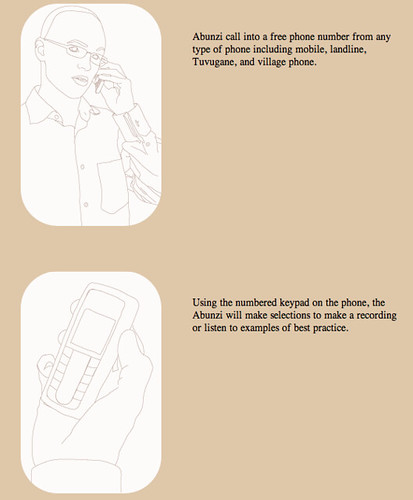Curator's Note
“If you never leave your village you think your ideas are the best ones.”
-Anonymous abunzi, Kirehe District, Rwanda
For my entry, I highlight the Oral Wiki project by software developer Cindy Jeffers. Using an expansive definition of transmedia as differing forms of meaning-making interacting or converging, I choose a site far afield from popular culture or even a saturated media environment. In her project, Jeffers asks how new media and information technologies can support and strengthen communities through generating new means for shared meaning-making.
Jeffers focuses on oral societies’ mechanisms for social maintenance and mediation, especially dispute remediation and informal justice systems. This project has been designed for Rwanda, a “post-conflict” site where a non-state forum for reconciliation is especially valued because formal judicial systems are seen to engender animosity. Jeffers first set out to understand traditional means for informal adjudication of civil disagreements, 80% of which center around land disputes. Abunzi are the go-to figures in Rwandan society who adjudicate between claimants, handling 70% of civil cases. Operating at the village level, with limited access to information regarding laws, the abunzi instead rely upon the aggregate knowledge they have gained from hearing a variety of cases and conferring with abunzi in nearby towns. Abunzi Jeffers met with expressed a need for a means by which to discuss best practice.
The Oral Wiki project acknowledges the sociotechnical factors that afford and constrain intervention and attempts to account for them in its design. These factors include state infrastructural investment that lags behind community needs, minimal access to the Internet (3%), and an uneven distribution of literacy among both the populace and abunzi (65% overall). Thus, the Oral Wiki project seeks to support and extend the informal justice system now in place, using telephones as the interface for a system for knowledge aggregation and sharing. This system would grant abunzi, ordinary citizens, and government officials access to an archive of case decisions; the archive would also support peer moderation (abunzi and citizens listening to and ranking others’ decisions), sharing of best practices, and tagging and categorizing archive entries. Jeffers hopes the Oral Wiki will facilitate sharing between people working in the informal justice system, which will in turn generate a more efficient and transparent informal justice system. It is deliberately designed to be a lightweight “bridging” infrastructure for consensus and reconciliation, likely with only temporary utility.
We might wonder about the consequences for distributing a system for mediation across platforms and geography. Whose participation and empowerment is supported? Madeleine Akrich suggests that networked technologies may play a role in creating the modern entity of the citizen through enrolling people into relationships with the state. At the same time, the Oral Wiki may enhance the durability of shared meaning-making between neighbors.
To experience the Oral Wiki, call the prototype at 646-833-0710.

Add new comment